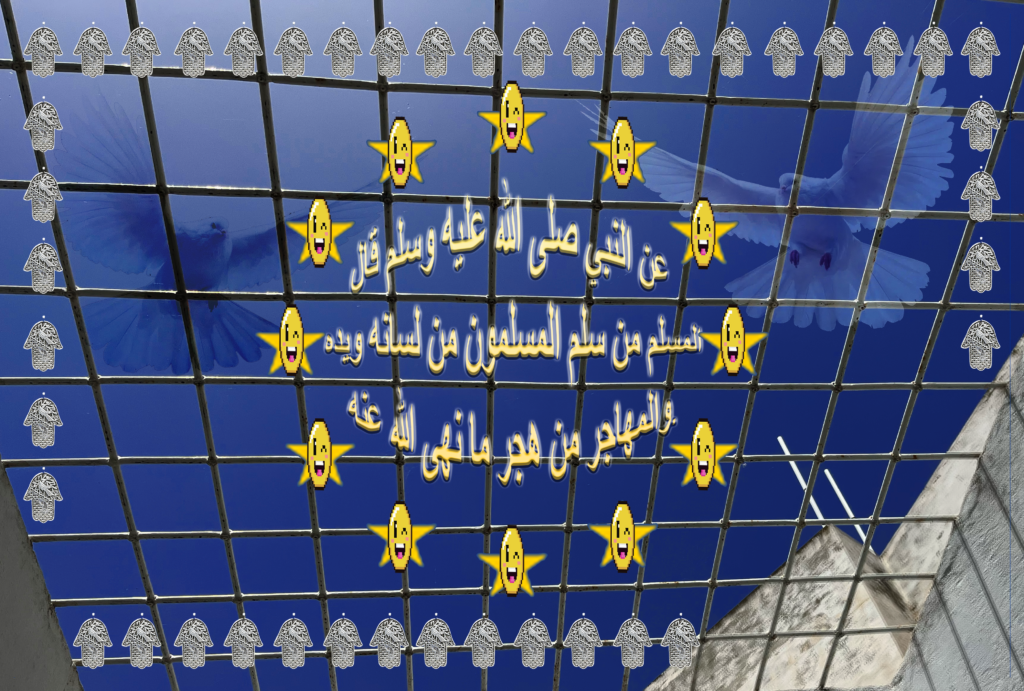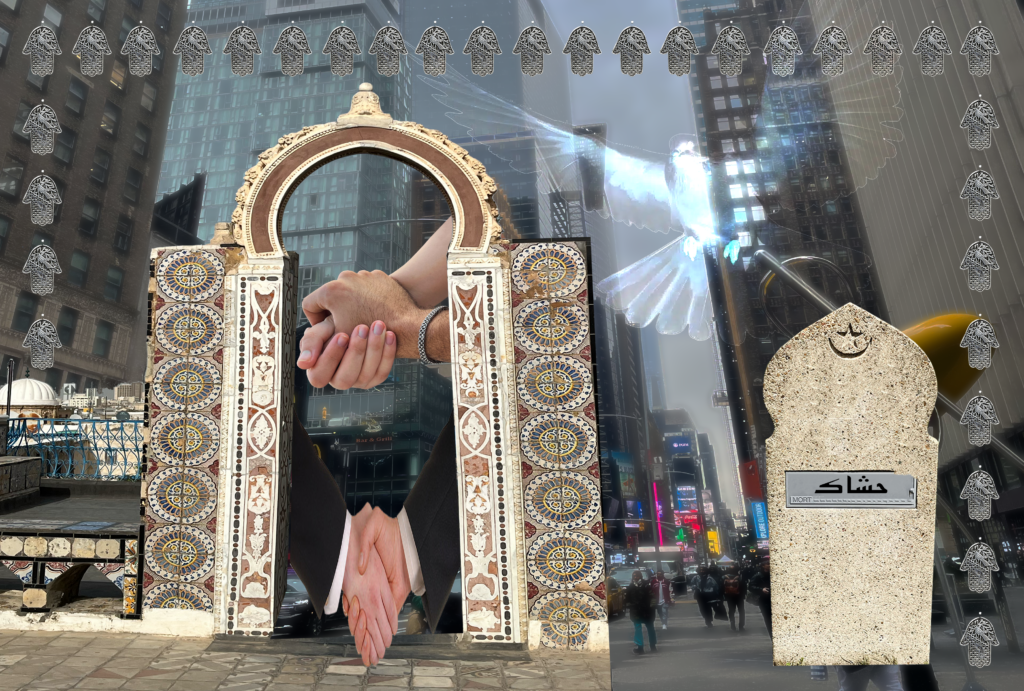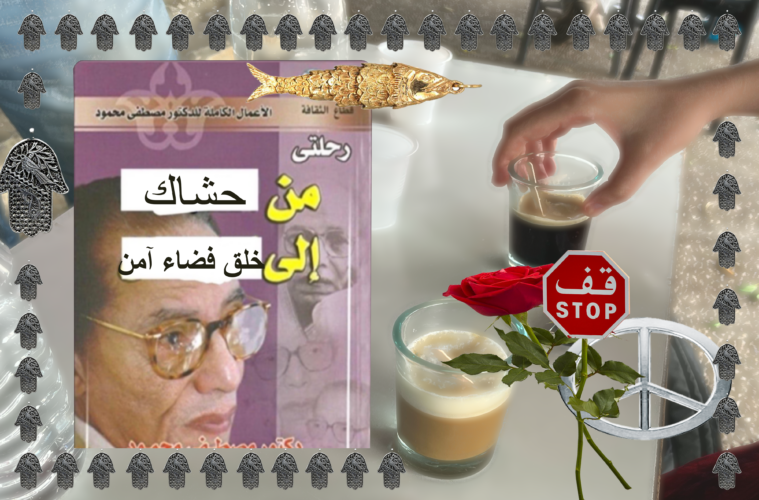Words by Tazir
Translation by Hiba Moustafa
Artworks by Omar
This piece is a supplement within the “Sana wara Sana” issue
Whenever we meet, my white European and American friends, fearing that they may sound racist, ask me again and again whether the labels they used are acceptable and inoffensive.
Their questions stem from the fact that I belong to a number of marginalized groups in Europe – I am an Arabic-speaking Black Muslim and a foreigner. They’ve made me feel the burden of representing these different identities. For them, these meetings are a walk in a field of cultural mines, where one frets about offending the other’s ethnicity or religion by saying or doing something insensitive.
Western Political Correction
At first, I considered this behavior a sign of respect, in contrast to the prevalent racism in my home country, Libya, and Germany, where I currently reside. Here in Western Europe, there is a growing trend of a culturally-sensitive anti-discrimination discourse that seeks to create safe spaces for less privileged groups. This became known as political correctness. Since it emerged in human rights and academic circles in the United States in the 1970s, its proponents have viewed it as path toward achieving peaceful coexistence.1 For that reason, many are careful to filter their language of words that could be seen as socially inappropriate. They apologize or promise to “do better” if they make a mistake, so as not to face being cancelled through online campaigns aimed at isolating those who violate the norms of political correctness. Part of a broader phenomenon of “cancel culture,” cancelling campaigns can affect their targets’ work, or even lead to school suspensions and ostracization, making an example of them to warn others.
Many scholars have criticized political correctness for its inefficacy in the fight against racism,2 censoring the right to expression and infringing on freedom of speech.3 Others, such as the Canadian psychologist and author Jordan Peterson – known for refusing to use gender-neutral pronouns in public spaces – have attacked this movement, describing it as insane and a threat to Western civilization.4
This controversy is not limited to the West. It’s also found its way into Muslim and Arabic-speaking societies, where the likes of Andrew Tate and Jordan Peterson have found supporters who cheer their crusades against the openness that political correctness calls for. It’s to the point of wishing that Peterson would convert to Islam, sealing his legacy as an advocate for conservative values.
This support declined when Peterson posted a video message addressed to Muslims, in which he urged them to “stop fighting among yourselves … and to stop regarding the Christians, and even more specifically, the Jews, as your enemies.” The video drew criticism in the comments, with many accusing him of being condescending and uninformed.5
Importing/Exporting the Problem
However, the attack on political correctness has not ceased in these countries. In Libya, for instance – like elsewhere in North Africa – many activists and their opponents have embraced the polarized Western debate around supporting or rejecting political correctness. They are preoccupied with these imported arguments at the expense of their own local traditions of accepting others and engaging with differences, which have the potential to address several social and political problems. This neglect has exacerbated several issues, including the arrests of activists and queers in Egypt, or the rise in racist rhetoric against African migrants at the official and popular levels, as in Libya and Tunisia.6 For example, over time, Libya’s local culture has formed a political correctness that, in some respects, allows for understanding and inclusion of new cultural developments.
As is the case with Euro-American political correctness, there are colloquial expressions whose purpose is to avoid offending neighbors and welcome strangers, inquiring about their lifestyle without causing insult and learning how to deal with differences. However, whereas the Euro-American version fears cancellation, local versions do not. When I traced the differences between the two models, I realized that political correctness in its common Western form is superficial and materialistic, relying on fear for one’s social image. This explains the caution and repeated apologies of the friends and activists I’ve met in the West, which often stems from fear of appearing rude and risk of being cancelled.

Artwork by Omar
Hence, the focus is on manifestations of tolerance rather than recognizing the other as an equal. In fact, this emphasis on coexistence goes as far as tokenism, which I have repeatedly encountered during my work and social interactions with white people. One becomes recognized as “woke,” as long as they adhere to the rules of “flexible language” or cautious behavior. This includes deliberately refraining from criticizing mistakes or calling out transgressions of black, Jewish, Muslim, or queer people, or anyone who isn’t a wealthy, cisgender white person.
This deliberate blindness is, in fact, a product of the social privilege enjoyed by liberals and those affiliated with the Western Left, who see themselves as the tolerant center of civilization. Maintaining this positive self-image conceals a subtle sense of condensing superiority. It seems that whoever occupies this center reserves for themselves the role of the wise man who has transcended so-called “cultural particularities,” “distinctive customs,” and “complex traditions.” Therefore, whoever is at the center is “fixed” and “colorless.” This is why non-whites are called “people of color,” a form of infantilizing these minorities. From this perspective, minorities are sensitive groups that still cling to ethnic features that are foreign to the West/the center, which calls for caution when addressing and dealing with them.
Here, identity reductionism masquerades as political correctness by confining marginalized groups to narrow cultural constraints, making it easier for the West to deal with them and even control them, and avoiding their demands for equal rights to those who occupy the center. Instead, they must remain ethnic groups with their own issues that prevent them from transcending into the realm of the normal and natural, i.e., the center.
I have often met white German people who “humbly” extend their hand and say they are “just Germans,” while calling me interesting and exotic because of my skin color and because I’m Libyan. They will then apologize the next day and replace “exotic” with “foreign” (worthy of curiosity) to fit the standards of political correctness!
Ethical Correctness
I call correctness in its Libyan form “moral correctness,” because unlike its Western counterpart, it depends not on the individual’s social image but rather on their sympathy or belonging to a minority group. An example is the debate over queer pronouns; while a debate over the necessity of using non-traditional pronouns that suit gender transition and non-binary genders rages in the West, the use of these pronouns in Libya is limited to queer groups. And, this is of little interest within these narrow circles, as the sense of one’s identity isn’t dependent on appearance and description alone.7
This radical distinction goes back to the origins of political correctness itself. In Libya, it is a product of people’s sensitivity to their environment, animate and inanimate subjects that inhabit it. It even goes as far as heightened sensitivity to the unseen world, whether out of fear or a desire to get closer to it.
This becomes clear when we consider the history of Libyan ancestors, who were divided into tribes by scarce resources, and were often at odds with one another. Asking about a stranger’s identity was a potential source of conflict. This is why we say in Libyan Arabic, “No offense, but where are you from?” to get to know a person, the tribe, or the country they belong to, recognizing that the question was insulting or offending that it required clarifying that no harm is meant.
Fear of the unseen – such as the evil eye – is strongly present in local culture. It is therefore frowned upon to raise five fingers into the face of someone while speaking to them, lest the listener be offended. The five-finger sign is considered a form of protection against envy. People even avoid using the word 7oot (fish) in conversation, because it is also a symbol of protection from evil eye. For example, instead of saying “We had fish for lunch,” people say “teghadhyna 7asha euynak” (tr. “We had, may you be protected from evil eye, fish”) not to offend. We also find this in Egyptian Arabic, when someone gives directions saying, “Go, no offense, left,” because “going left” can also mean “straying from the right path.” Likewise, in the region extending from Libya to Mauritania, you cannot use the word “Al-‘Afiyah” to wish someone well-being without being met with disapproval or at least astonishment, as it also can mean “fire.” Since fire burns and harms, an antonym has been adopted to refer to it. And the more “wellbeing” has been established as a synonym for fire, the more it’s lost its positive connotations.

Artwork by Omar
As in the above examples, the phenomenon of linguistic inversion can also be found across many African cultures, where naming things and people holds great significance, due to the belief in their (fateful) role in bringing good and warding off evil.8 In the Libyan case, this phenomenon is embedded in the etiquette of correctness. For example, in Libyan Arabic, a blind person is called “absir,” “the one who sees,”, and a poor person who begs is called “yuhab,” meaning “the one who gives.” In Tunisia, an overweight person is described by the word “bisahtuhu,” meaning “healthy and well,” even if they are not! It’s become a taboo to directly call someone blind, poor, or overweight, even if they are.
These examples, especially those under “Libyan moral correctness” (which seems more appropriate to our cultures than “political correctness”) arise from a sense of fear, like with cases of Euro-American correctness. However, fear in our local context comes from avoidance of harm, whether tangible or unseen. But it also does not seek to contain the strange or the unknown. This is a lesson inherited from our ancestors, following a long history with the colonial stranger, and from natural phenomena controlled by mysterious forces. A legend dating back to the 5th century BCE tells of the Basili tribe declaring war on the southern wind. They marched to fight it, but it swallowed them up, and the fear of the southern wind has only recently subsided.9
Libyan Sufism has refined these fears, channeling their fear of God in order to spread sympathy, fair treatment of others, and kindness. Sufi schools in North Africa share due to their interconnected ways, as seen in the letters of the great reformer Abd As-Salam Al-Asmar to his disciples in North, West, and East Africa. They connect religious devotion and accepting “the righteous and the wicked,” as he stated in a letter to his disciples in Morocco. He extended this to kindness toward wrongdoers and oppressors. As he wrote to his students in Tripoli, “I advise you, and myself, to fear God… and to be gentle with the righteous and the wicked, and to be kind to your neighbors, and to endure their harm… do not return their wrongs, and forgive them…”
Al-Asmar, who lived in Libya in the 16th century AD, is a distinguished intellectual figure in religious and humanistic discourse in the region.10 He contributed significantly to shaping the code of moral correctness, emphasizing respect for everyone in the community including the diversity of African languages and ethnicities. He advised his disciples interested in studying the Arabic language in Timbuktu, present-day Mali, “A grammarian shouldn’t see himself as superior to others… and shouldn’t mock the speech of others if it lacks fluency because people have diverse ethnicities and backgrounds.”11 However, this heritage hasn’t been sufficiently examined. This leaves opponents of political correctness in these countries to believe that it is a Western invention that seeks to spread depravity, and its proponents to consider it, in its Western form, as the most useful tool for promoting human rights. Indeed, there is space in North Africa’s heritage for promoting “human rights” and local moral values rather than importing Western debate about political correctness. We can find a balance between trying to understand our societies from within to find remedy for their problems in culture itself and expanding local correctness to include every new world experience.
- Nina Degele, “Political Correctness zwischen Gleichheit, Privilegien und Gerechtigkeit,” Außerschulische Bildung, no. 4 (2021).
- Paris Will and Odessa S. Hamilton, “Is political correctness holding back progress on diversity, equality, and inclusion?” LSE Business Review, September 6, 2021.
- Martina Thiele, “Political correctness and Cancel Culture – a question of power! The case for a new perspective,” Journalism Research 4, no. 1(2021): 50-57.
- Dorian Lynskey, “How dangerous is Jordan B Peterson, the rightwing professor who ‘hit a hornets’ nest’?” The Guardian, February 7, 2018.
- Jordan Peterson, “Article: Message to Muslims,” July 13, 2022.
- “Survey: Nearly half of Libyans consider racial discrimination a problem in the country,” Aswat; “Tunisia: President’s racist speech incites a wave of violence against Black Africans,” Amnesty International, March 2023.
- Tazir, “Pronouns War: Not A Man!” Jeem, December 13, 2021.
- Rethabile Possa-Mogoera, “A bad name is an omen: Stigmatising names amongst the Basotho,” Literator 41, no.1 (2020): 2; Gladys Udechukwu and Nkoli Nnyigide, “The religious and socio-cultural implication of African names: Igbo naming system as a paradigm,” International Journal of Arts and Humanities, 2016.
- Abdul Latif Mahmoud Barghouti, Ancient Libyan History from the Oldest Ages to the Islamic Conquests, (Tawalt Foundation, 2013), 126.
- A. Arbawi Omar, “Human Dimensions of the Reform Project of Abd As-Salam Al-Asmar: An Examination of the Status of Women and Youth as a Human Social Dimension,” in Reform Conference, edited by Ahmed Al-Qatani, 2023, 161.
- Al-Asmar Abd As-Salam bin Salim al-Idrisi al-Hassani, Letters to His Disciples, compiled and edited by Mostafa Imran Rabia, (Al Madar Al Islami, 2002), 233.

